Attached files
| file | filename |
|---|---|
| 8-K - FORM 8-K - PATTERSON UTI ENERGY INC | d883447d8k.htm |
 Raymond James
36
th
Annual Institutional Investors Conference
March 3-4, 2015
Exhibit 99.1 |
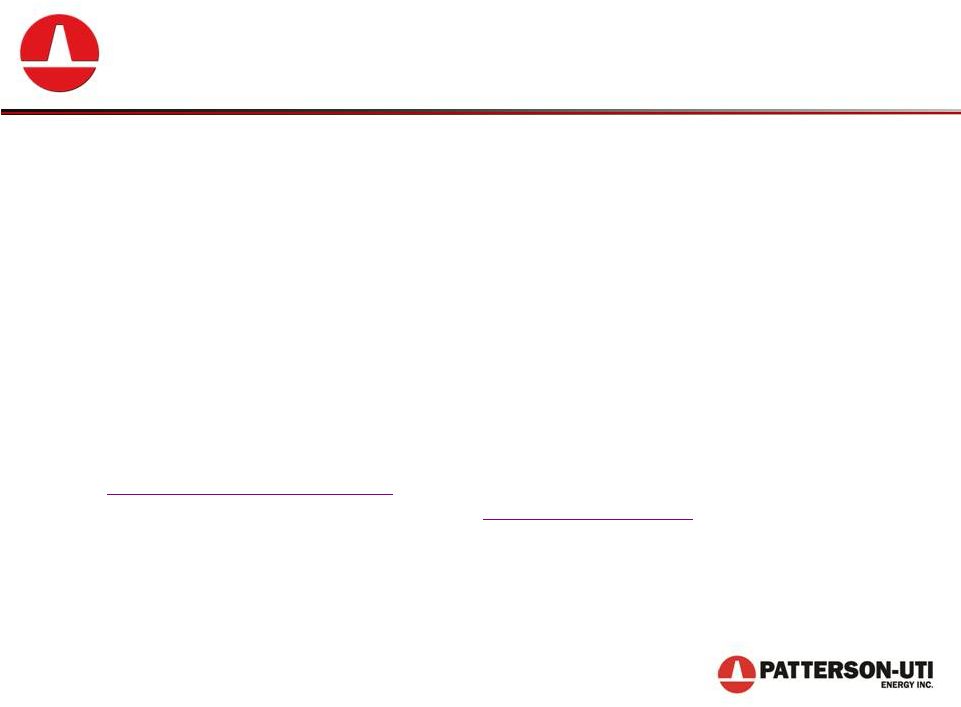 Forward Looking Statements
2
This material and any oral statements made in connection with this material
include "forward-looking statements" within the meaning of
the Securities Act of 1933 and the Securities Exchange Act of
1934. Statements made which provide the Company’s or
management’s intentions, beliefs, expectations or predictions for
the future are forward-looking statements and are inherently uncertain. The
opinions, forecasts, projections or other statements other than
statements of historical fact, including, without limitation, plans and
objectives of management of the Company are forward-looking
statements. It is important to note that actual results could
differ materially from those discussed in such forward-looking
statements. Important factors that could cause actual results to differ
materially include the risk factors and other cautionary statements
contained from time to time in the Company’s SEC filings, which may
be obtained by contacting the Company
or
the
SEC.
These
filings
are
also
available
through
the
Company’s
web
site
at
http://www.patenergy.com
or
through
the
SEC’s
Electronic
Data
Gathering
and
Analysis
Retrieval
System
(EDGAR)
at
http://www.sec.gov.
We
undertake
no
obligation to publicly update or revise any forward-looking
statement. Statements made in this presentation include
non-GAAP financial measures. The required reconciliation to
GAAP financial measures are included on our website and at the end of
this presentation. |
 Patterson-UTI Energy is a leading
provider of contract drilling and
pressure pumping services
3 |
 Contract Drilling
•
High quality fleet of land drilling
rigs including 149 APEX
®
rigs
•
Leader in walking rig technology for
pad drilling applications
•
Large footprint across North
American drilling markets
Patterson-UTI reported results for the year ended December 31, 2014
4
Pressure
Pumping
41%
Oil &
Natural
Gas
1%
Contract
Drilling
58%
Components of Revenue |
 Pressure Pumping
•
High quality fleet of modern pressure
pumping equipment
•
A leader in natural gas bi-fuel
technology
•
Strong reputation for regional
knowledge and efficient operations
Patterson-UTI reported results for the year ended December 31, 2014
5
Pressure
Pumping
41%
Oil &
Natural
Gas
1%
Contract
Drilling
58%
Components of Revenue |
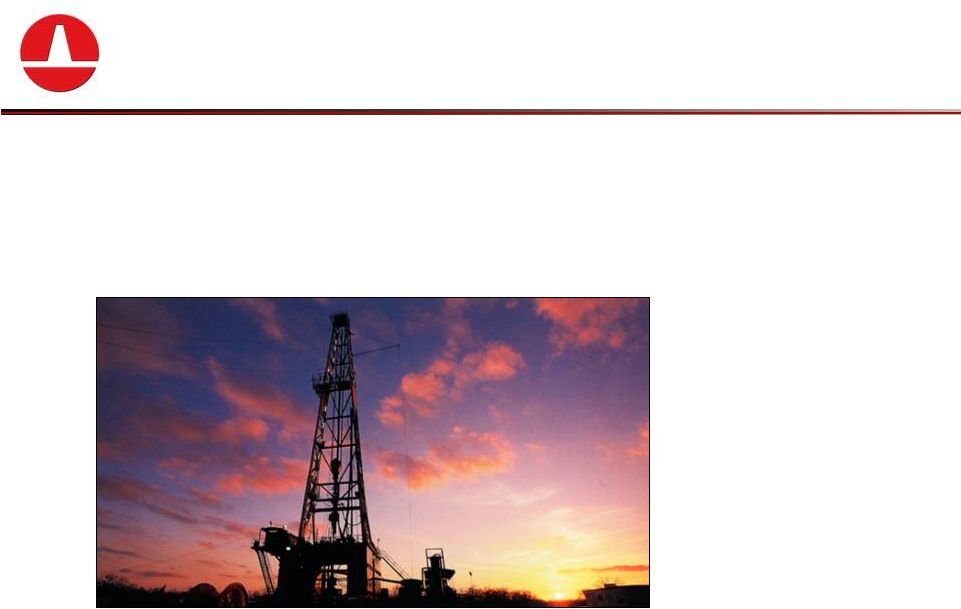 Contract Drilling |
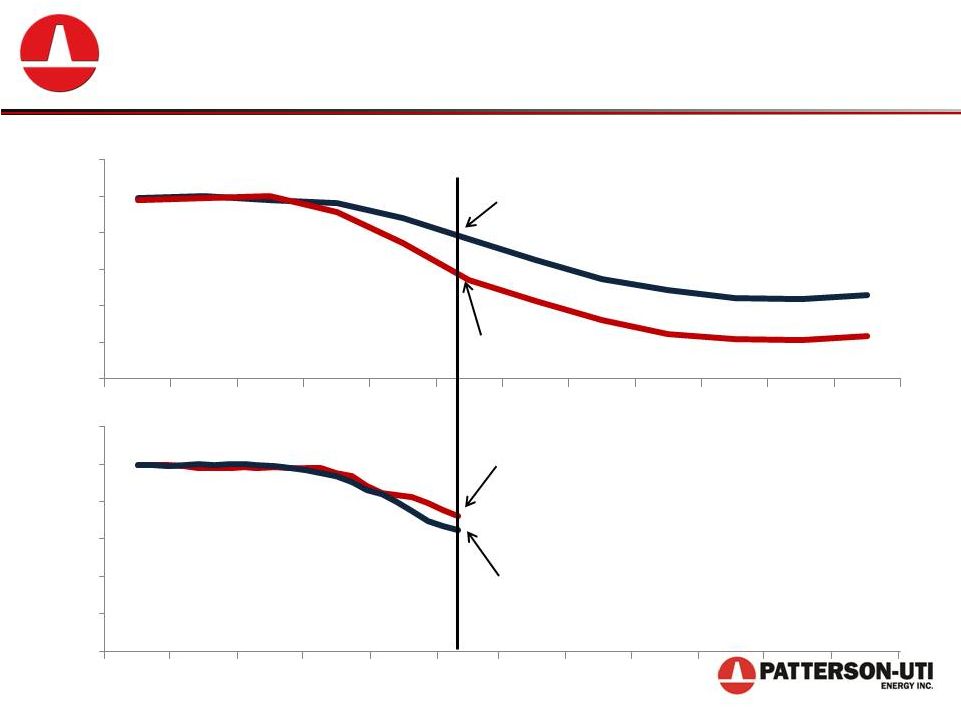 Improved Performance
2008 -
2009
Total Baker Hughes U.S. Land Rig Count: -23%
Total PTEN U.S. Rig Count: -
46%
2014 -
2015
Total PTEN U.S. Rig Count: -28%
Total Baker Hughes U.S. Land Rig Count: -35%
Baker Hughes and Patterson-UTI U.S. Land Rig Counts as of February 27, 2015
0%
20%
40%
60%
80%
100%
120%
U.S. Rig Count Downturn
0%
20%
40%
60%
80%
100%
120% |
 A Rig Fleet Transformation
8
Mechanical
Patterson-UTI Energy Total Rig Fleet
Mechanical
December 2009
Projected December 2015
Other
Electric
APEX®
Other
Electric
APEX® |
 …and Expected as of December 31, 2015
APEX-XK
1500™
APEX-XK
1000™ APEX
WALKING ®
APEX 1500
®
APEX 1000
®
Total APEX
®
Rigs
Class
APEX
®
Rigs as of March 3, 2015
53
4
49
44
11
161
12/31/2015
A leader in high specification drilling rigs
41
4
49
44
11
149
3/3/2015
APEX
®
Rig Fleet
9 |
 Permian Basin
32 Rigs
Large Geographic Footprint
10
PTEN’s Active U.S. Land Drilling Rigs
as of February 27, 2015
Appalachia
35 Rigs
East Texas
14 Rigs
Mid-Continent
16 Rigs
South Texas
32 Rigs
Rockies
26 Rigs |
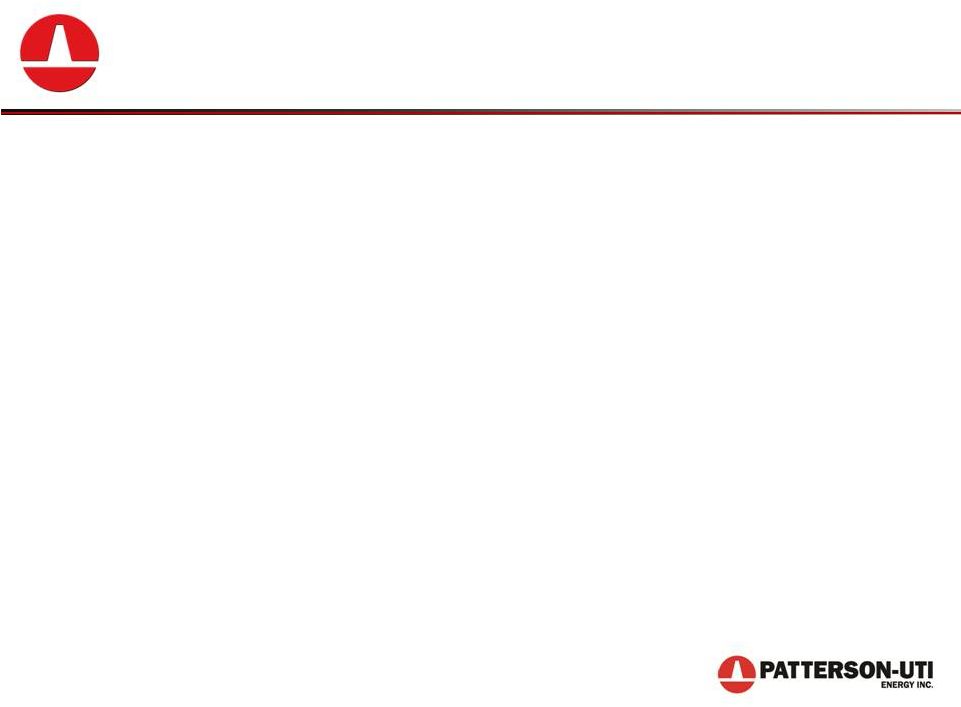 Patterson-UTI Energy
…the impact of APEX®
rigs has been transformative! |
 Increasing APEX
®
Drilling Activity
12
Active APEX
®
Rig Count
0
20
40
60
80
100
120
140
160 |
 PTEN Relative Active Rig Count by Rig Class
13
0%
10%
20%
30%
40%
50%
60%
70%
80%
90%
100%
APEX®
Other Electric
Mechanical |
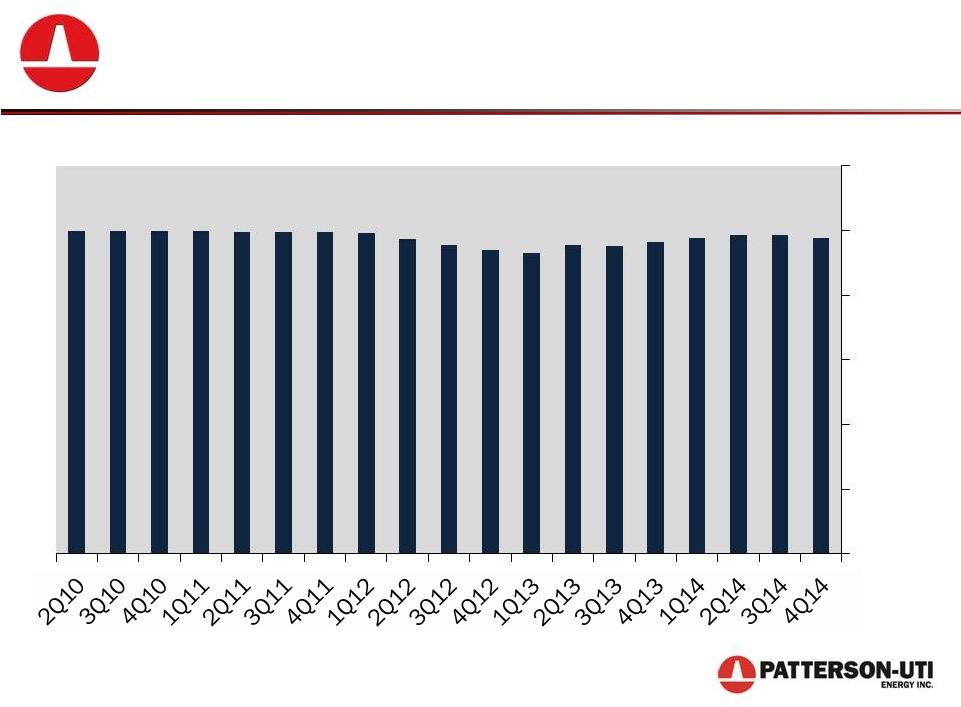 Greater Stability of Utilization
14
APEX
®
Rig Utilization
0%
20%
40%
60%
80%
100%
120% |
 Improving Average Rig Revenue Per Day
15
Patterson-UTI Total Average Rig Revenue Per Day
Excludes
early-termination
revenues
during
the
third
and
fourth
quarter
of
2013
of
$3,600
per
day
and
$130
per day, respectively.
10,000
12,000
14,000
16,000
18,000
20,000
22,000
24,000
26,000 |
 Adjusted EBITDA Contribution from High
Specification Rigs
16
Preferred rigs account for approximately
89% of Adjusted EBITDA in Contract Drilling
APEX®
&
Other
Electric
Mechanical
2010
2011
2012
2013
2014
Excludes early-termination revenues during the third and fourth quarter of
2013 of $62.8 million and $2.4 million, respectively. |
 Patterson-UTI Energy
…the APEX®
rig outlook remains strong! |
 18
U.S. Rig Count % by Drilling Type
Continued Demand for APEX
®
Rigs
Source: Baker Hughes North America Rotary Rig Count
0%
10%
20%
30%
40%
50%
60%
70%
80%
% Horizontal
% Vertical |
 AC-powered rigs have increased as a
percentage of the horizontal rig count
Total U.S. Horizontal Rig Count by Power Type
Continued Demand for APEX
®
Rigs
Analysis from Patterson-UTI Energy based on data from RigData and company
filings. 19
SCR
AC
Mechanical |
 Patterson-UTI Energy
…Patterson-UTI is a technology leader!
|
 APEX WALKING
®
Rigs
21
•
Capable of walking with drill pipe
and collars racked in the mast
•
Full multi-directional walking
capability
•
Walking times average 45 minutes
for 10’
–
15’
well spacing
http://patenergy.com/drilling/technology/apexwalk
21 |
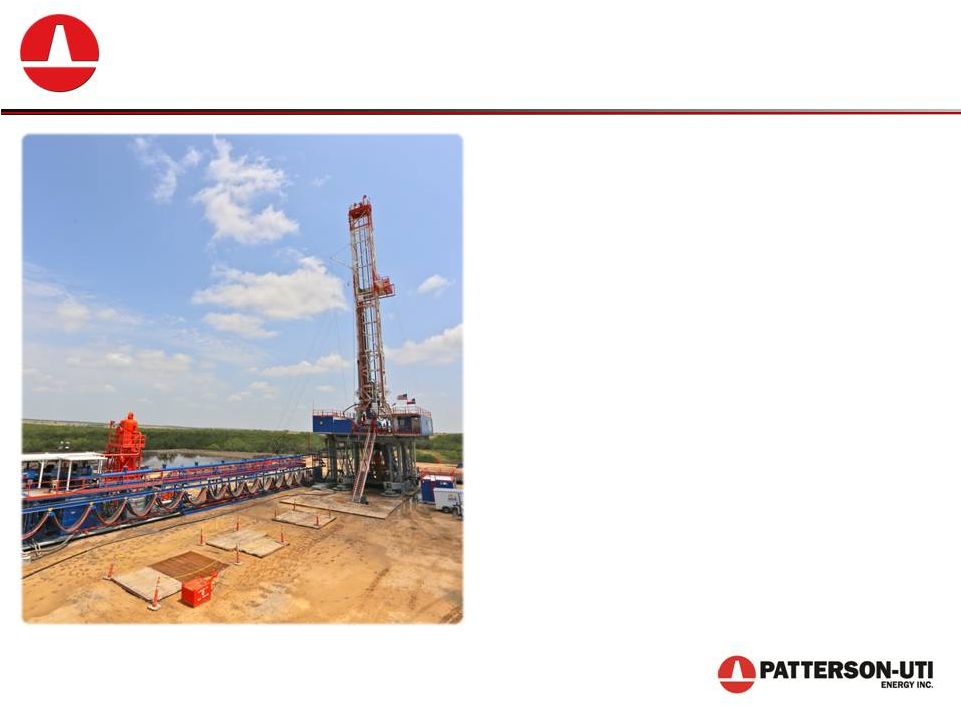 Strong Demand for Pad Drilling
22
•
Pad drilling is contributing to
increasing rig efficiency
•
Pad drilling capable rigs are
highly utilized
•
Most new APEX
®
rigs are
expected to have walking
systems
http://patenergy.com/drilling/technology
22 |
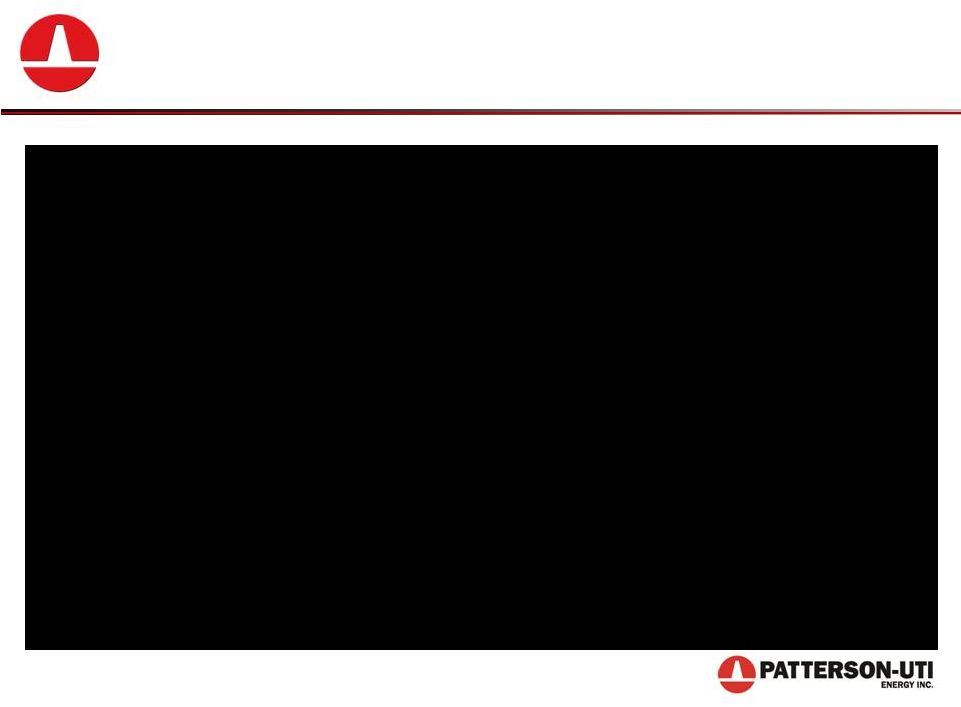 APEX-XK™
Rig Walking on Pad
23
http://patenergy.com/drilling/technology/apexwalk/
Video of
APEX-XK™
Rig
23 |
 The APEX-XK
™
24
•
Enhanced mobility including more
efficient rig up and rig down
•
Greater clearance under rig floor for
optional walking system
•
Advanced environmental spill
control integrated into drilling floor
•
Minimized number of truck loads for
rig moves
•
Available in both 1500 HP and 1000
HP
http://patenergy.com/drilling/technology
24 |
 Enhancing our Position in Pad Drilling
25
Walking Systems Can be Added to Any Rig in Our Fleet…
…Allowing for True Multi-Directional Pad Drilling Capabilities
25 |
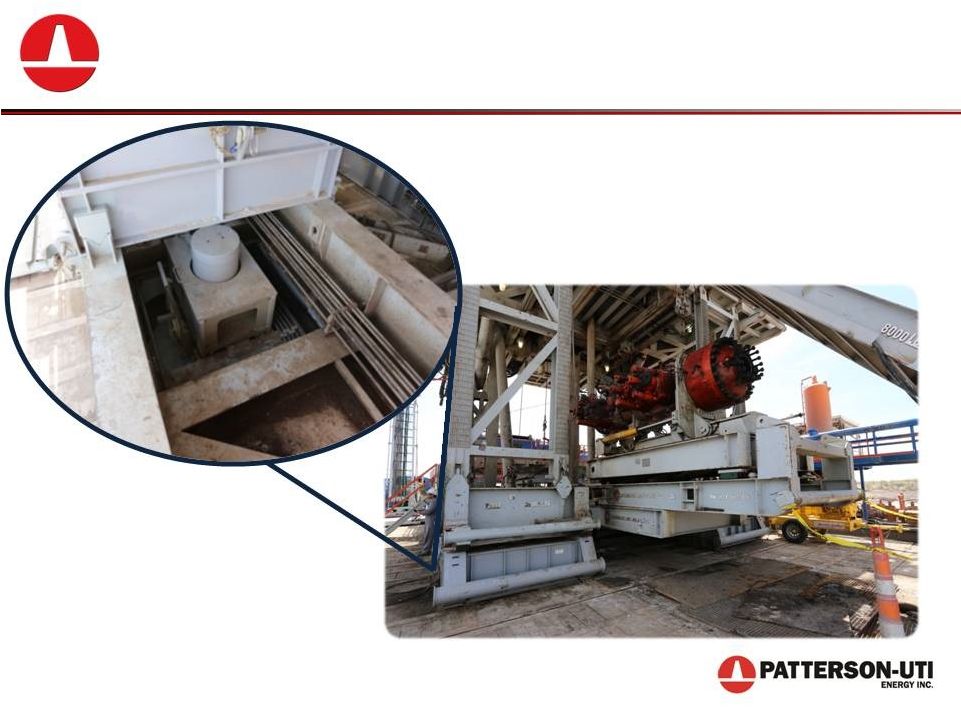 Enhancing our Position in Pad Drilling
26
http://patenergy.com/drilling/technology
26 |
 Early Adopter of Natural Gas Engines
27
http://patenergy.com/drilling/technology
27 |
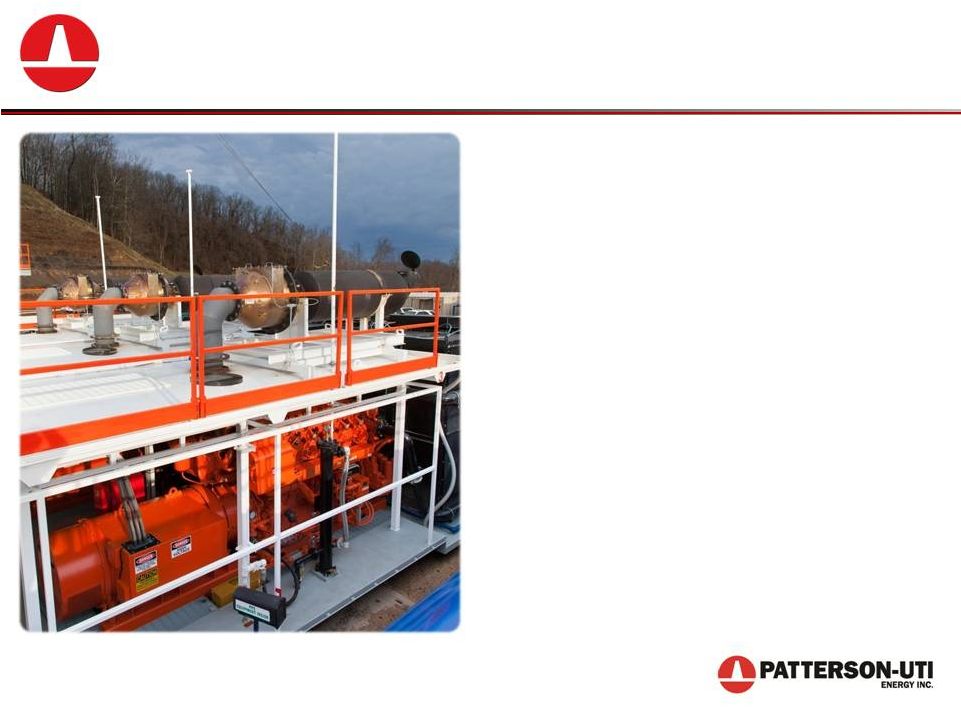 Using Natural Gas as a Fuel Source
28
•
First contract driller to use GE’s
Waukesha natural gas engines on
a modern land rig
•
54 rigs currently configured to use
natural gas as the primary fuel
source including 10 natural gas
powered rigs and 44 bi-fuel
capable rigs
•
We plan to add bi-fuel systems to
four contracted new APEX
®
rigs to
be completed in 2015
•
Natural gas powered rigs can
result in up to 80% lower fuel
costs
http://patenergy.com/drilling/technology
28 |
 Pressure Pumping |
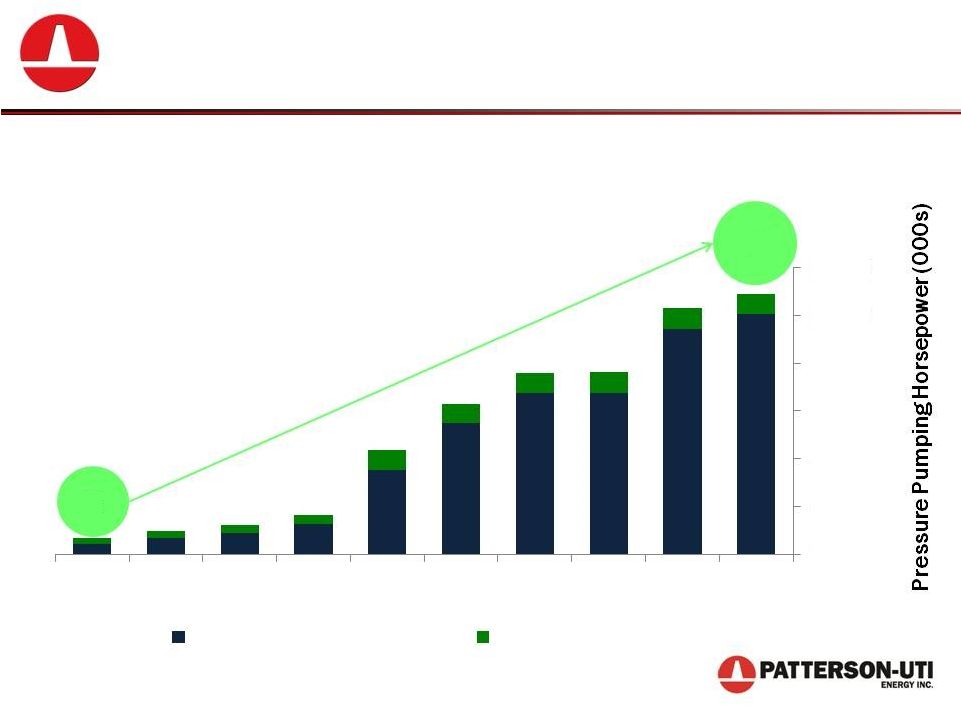 Growing Pressure Pumping Business
30
Investments in Pressure Pumping…
…Have Increased Fleet Size and Quality
65
1,100
0
200
400
600
800
1000
1200
2006
2007
2008
2009
2010
2011
2012
2013
2014
June
2015E
Year End
Fracturing Horsepower
Other Horsepower |
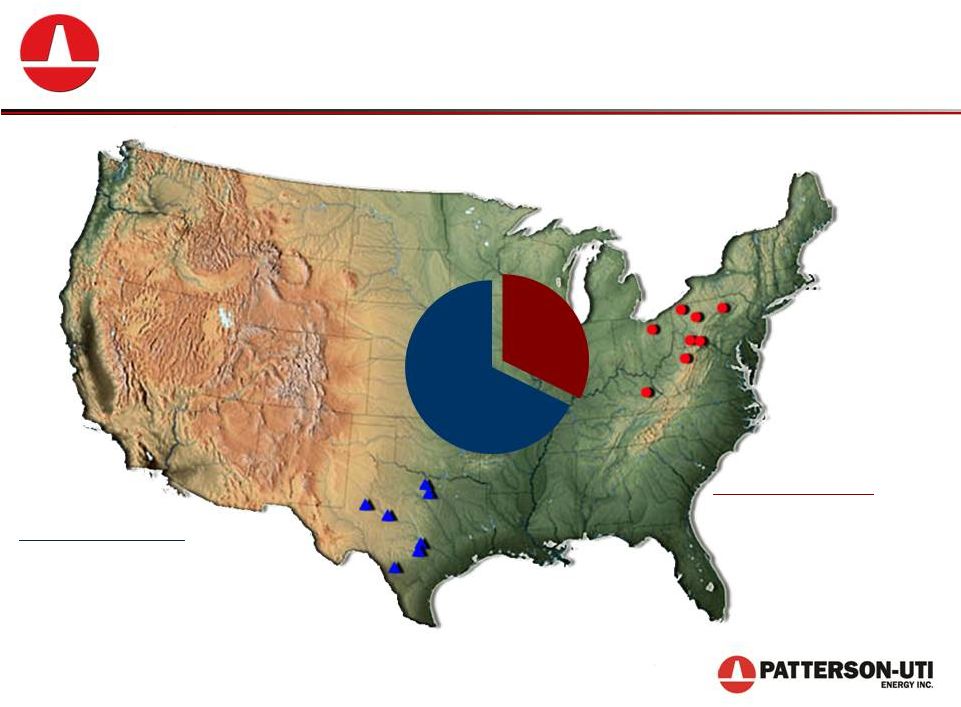 Fracturing horsepower: 638,800
Other horsepower: 32,165
Fracturing horsepower: 303,800
Other horsepower: 54,700
A Significant Player in Regional Markets
Pressure Pumping Areas
31
Horsepower distribution as of December 31, 2014
32%
68%
Fracturing Horsepower
Southwest Region:
Northeast Region: |
 A Leader in Bi-Fuel Technology
•
Engines can burn a fuel mix
comprised of up to 70% natural
gas
•
Comparable torque and
horsepower to an all diesel engine
•
Reduces operating costs by
lowering fuel costs
•
Good for environmental
sustainability
http://patenergy.com/pressurepumping/services
32 |
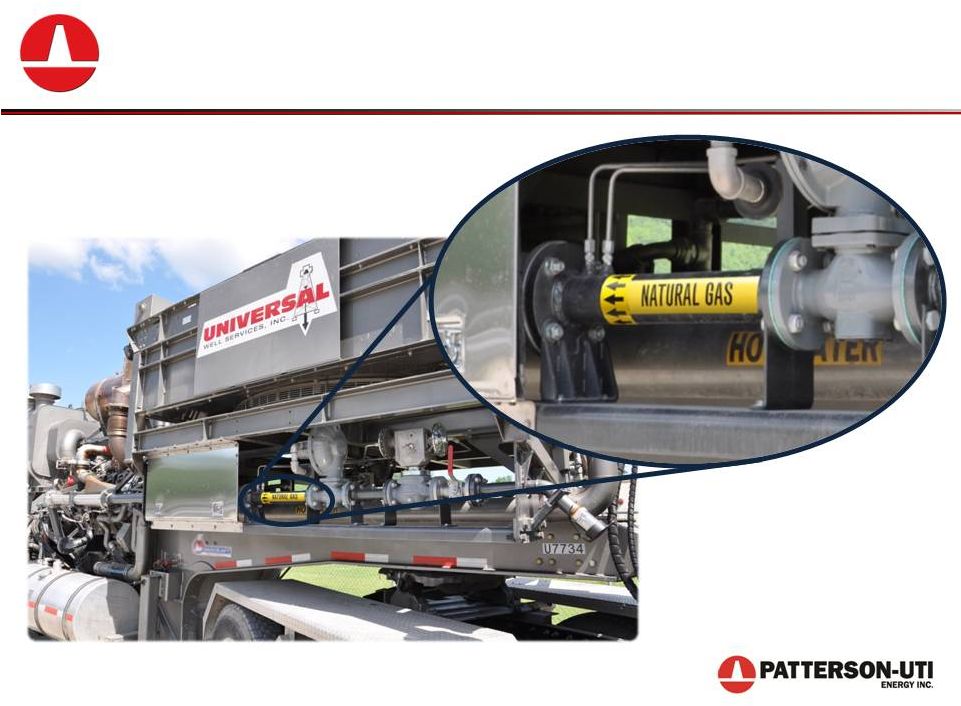 A Leader in Bi-Fuel Technology
33
http://patenergy.com/pressurepumping/services
33 |
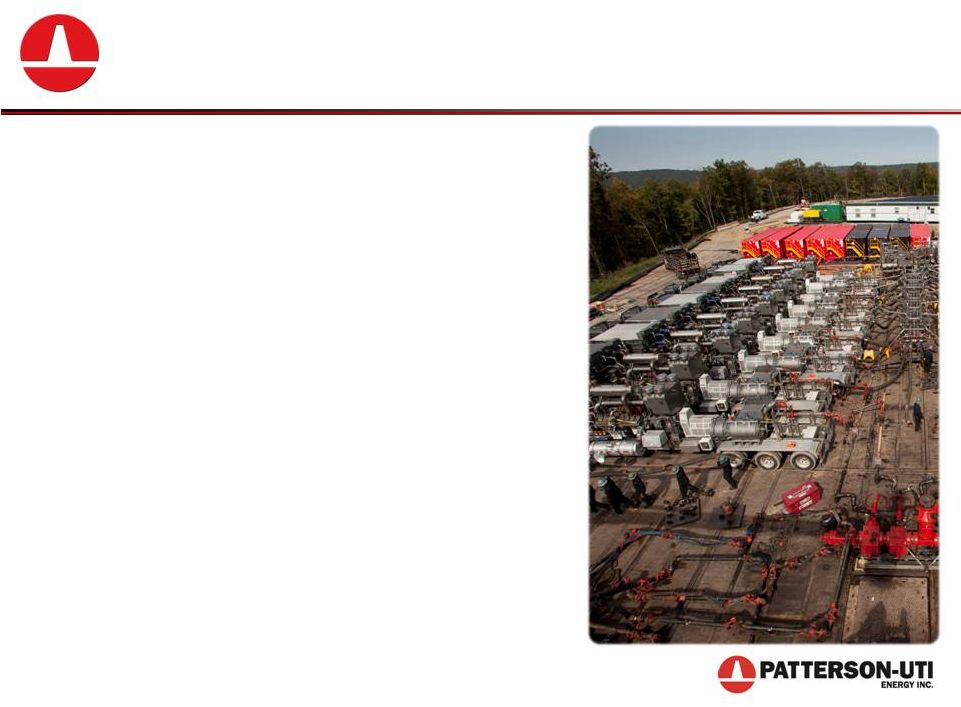 A Leader in Bi-Fuel Technology
34
•
One of the largest bi-fuel frac
fleets in the Marcellus
•
Approximately 1,800 stages
completed using natural gas as a
fuel source
•
Replaced approximately 1.2
million gallons of diesel with
cleaner burning natural gas
•
Eliminated 9.0 million pounds of
transportation loads on local
roads
http://patenergy.com/pressurepumping/services
34 |
 Comprehensive Lab Services
http://patenergy.com/pressurepumping/services
35 |
 Financial Flexibility |
 Investing in Our Company
37
Capital Expenditures and Acquisitions
($ in millions)
2015 Capital expenditure forecast as of February 5, 2015
$598
$637
$445
$453
$976
$1,012
$974
$662
$1,229
$750
2006
2007
2008
2009
2010
2011
2012
2013
2014
2015E |
 Strong Financial Position
38
•
History of returning capital to investors
–
Cash Dividend
•
Initiated cash dividend in 2004
•
Doubled quarterly cash dividend to $0.10 per share in
February 2014
–
Stock Buyback
•
Total of $857 million repurchased since 2005
•
Approximately $187 million remaining authorization as of
December 31, 2014
•
Returned approximately $1.3 billion to shareholders
since 2005 |
 Strong Financial Position
39
Total Liquidity
($ in millions)
Liquidity defined as end of period cash plus availability under revolving line
of credit *
Subsequent to December 31, 2014, we received an $82 million federal income tax
refund. The refund, along with other cash generated was used to
repay $103 million outstanding under our revolving line of credit. As of
February 10, 2015, availability under the revolving credit facility was $260
million. 2006
2007
2008
2009
2010
2011
2012
2013
2014
Pro Forma
2014*
Year End
Line of Credit Availability
Cash |
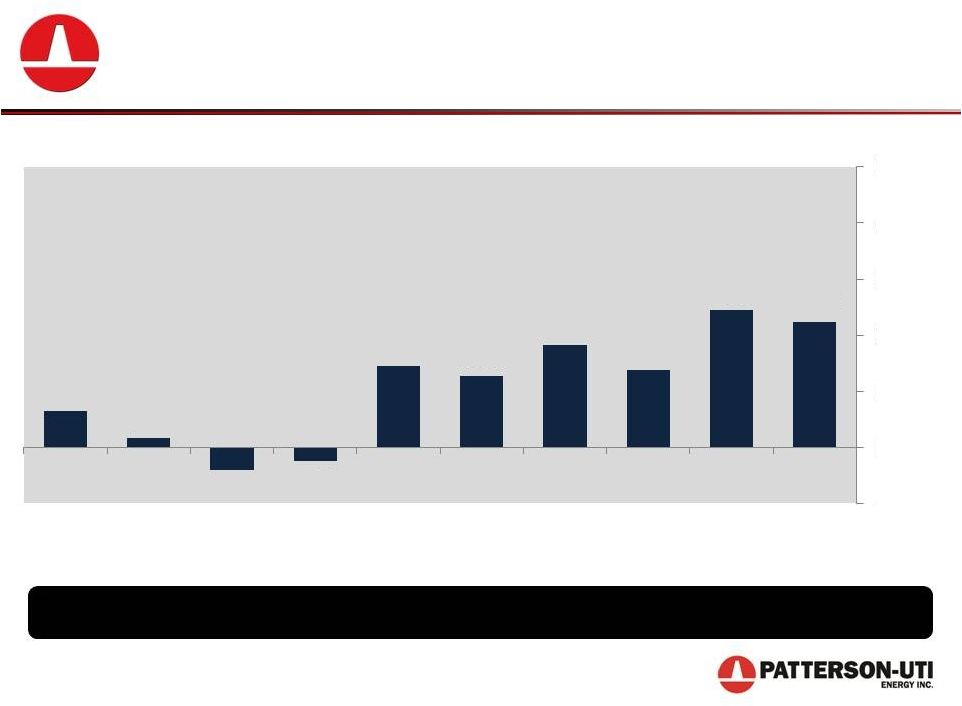 Strong Financial Position
40
Net Debt to Capital Ratio
$600 million of debt not due until at least 2020
*
Subsequent to December 31, 2014, we received an $82 million federal income tax
refund. The refund, along with other cash generated was used to
repay $103 million outstanding under our revolving line of credit. As of
February 10, 2015, availability under the revolving credit facility was $260
million. 6%
2%
-4%
-2%
15%
13%
18%
14%
24%
22%
-10%
0%
10%
20%
30%
40%
50%
2006
2007
2008
2009
2010
2011
2012
2013
2014
Pro Forma
2014*
Year End |
 Why Invest in Patterson-UTI Energy?
•
Continuing Transformation
–
Committed to high-spec land rigs where
demand remains strong
–
Creating value through focus on well
site execution
•
Technology leader
–
Leader in walking rigs for pad drilling
–
Innovator in use of natural gas as a fuel
source for both drilling and pressure
pumping
•
Financially flexible
–
Strong balance sheet
–
History of share buybacks
–
Dividends
41 |
 Raymond James
36
th
Annual
Institutional
Investors
Conference
March 3-4, 2015 |
 43
Contract Drilling Capital Expenditures and Acquisitions
($ in millions)
Investing in Our Drilling Rig Fleet
More than $5 billion invested since 2005
2015 Capital expenditure forecast as of February 5, 2015
$531
$540
$361
$395
$656
$785
$745
$505
$772
$525
2006
2007
2008
2009
2010
2011
2012
2013
2014
2015E |
 Investing in Pressure Pumping
44
Pressure Pumping Capital Expenditures and Acquisitions
($ in millions)
More Than $1.4 billion invested since 2005
2015 Capital expenditure forecast as of February 5, 2015
$41
$48
$61
$43
$289
$198
$194
$123
$418
$200
2006
2007
2008
2009
2010
2011
2012
2013
2014
2015E |
 Term Contract Coverage
45
Based on term contracts in place as of February 5, 2015
An average of 138 rigs expected under term contract in the first
quarter of 2015
An average of 104 rigs expected under term contract during
2015
Drilling term contract revenue backlog of $1.5 billion at
December 31, 2014
Due to market conditions, we have received, and expect to
continue to receive, notice from some customers to
terminate term contracts. The receipt of early termination
payments will result in earlier than planned cash inflows and
reduced term contract revenue backlog. |
 Strong Financial Position
•
Total liquidity of approximately $200 million*
–
$43.0 million of cash at December 31, 2014
–
$157 million revolver availability at December 31, 2014*
•
$942.5 million net debt at December 31, 2014*
–
24.5% Net Debt/Total Capitalization*
–
$300 million of 4.97% Series A notes due October 5, 2020
–
$300 million of 4.27% Series B notes due June 14, 2022
–
$82.5 million of 5-year term loan
–
$303 million outstanding under revolving line of credit
•
No equity sales in last 14 years
•
Reduced share count by 26.0 million shares since 2005
46
*
Subsequent to December 31, 2014, we received an $82 million federal income tax
refund. The refund, along with other cash generated was used to
repay $103 million outstanding under our revolving line of credit. As of
February 10, 2015, availability under the revolving credit facility was $260
million. |
 PATTERSON-UTI ENERGY, INC.
Non-GAAP Financial Measures (Unaudited)
(dollars in thousands)
Non-GAAP Financial Measures
47
Three Months Ended
December 31,
Twelve Months Ended
December 31,
2014
2013
2014
2013
Adjusted Earnings Before Interest, Taxes, Depreciation and Amortization
(Adjusted EBITDA)(1):
Net income
$
57,583
$
16,591
$
162,664
$
188,009
Income tax expense
41,216
9,475
91,619
108,432
Net interest expense
8,034
6,947
28,846
27,441
Depreciation, depletion, amortization and impairment
180,157
183,118
718,730
597,469
Adjusted EBITDA
$
286,990
$
216,131
$1,001,859
$
921,351
Total revenue
$
901,219
$
658,772
$3,182,291
$2,716,034
Adjusted EBITDA margin
31.8%
32.8%
31.5%
33.9%
Adjusted EBITDA by operating segment:
Contract drilling
$
208,200
$
172,178
$
765,874
$
704,990
Pressure pumping
78,763
45,757
236,676
217,228
Oil and natural gas
7,671
8,757
37,094
44,348
Corporate and other
(7,644)
(10,561)
(37,785)
(45,215)
Consolidated Adjusted EBITDA
$
286,990
$
216,131
$1,001,859
$
921,351
(1)
The company makes use of financial measures that are not calculated in
accordance with U.S. generally accepted accounting principles (“GAAP”) to help in the
assessment of ongoing operating performance. These non-GAAP financial
measures are reconciled to their most directly comparable GAAP measures in the tables
above. We define Adjusted EBITDA as net income plus net interest expense,
income tax expense and depreciation, depletion, amortization and impairment
expense. We present Adjusted EBITDA because we believe it provides additional
information with respect to both the performance of our fundamental business
activities and our ability to meet our capital expenditures and working capital
requirements. Adjusted EBITDA is not defined by GAAP and, as such, should not be
construed as an alternative to net income (loss) or operating cash flow. We
define margin as revenues less direct operating costs. We present margin because we
believe it to be the component of our earnings most impacted by the variability
in our contract drilling and pressure pumping operations. Margin is not defined by
GAAP and, as such, should not be construed as an alternative to net income
(loss). |
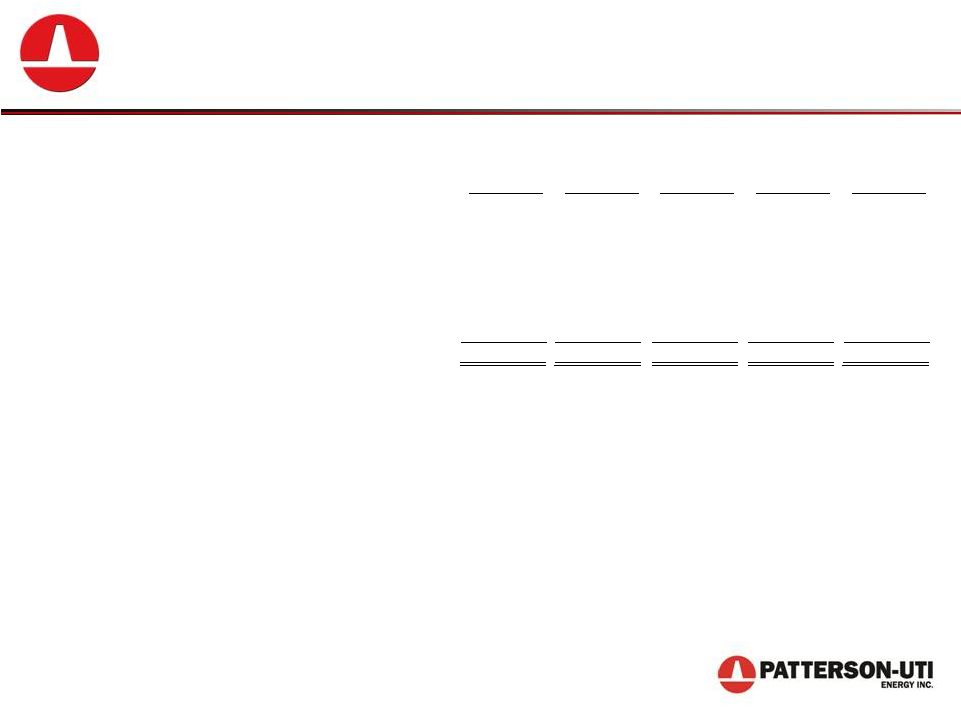 Non-GAAP Financial Measures
48
2014
2013
2012
2011
2010
Adjusted Earnings Before Interest, Taxes, Depreciation and Amortization
(Adjusted EBITDA)(1):
Net income (loss)
$
162,664
$
188,009
$
299,477
$
322,413
$
116,942
Income tax expense (benefit)
91,619
108,432
176,196
187,938
72,856
Net interest expense (income)
28,846
27,441
22,196
15,465
11,098
Depreciation, depletion, amortization and impairment
718,730
597,469
526,614
437,279
333,493
Net impact of discontinued operations
-
-
-
(209)
1,778
Adjusted EBITDA
$
1,001,859
$
921,351
$
1,024,483
$
962,886
$
536,167
Total revenue
$
3,182,291
$
2,716,034
$
2,723,414
$
2,565,943
$
1,462,931
Adjusted EBITDA margin
31.5%
33.9%
37.6%
37.5%
36.7%
PATTERSON-UTI ENERGY, INC.
Non-GAAP Financial Measures (Unaudited)
(dollars in thousands)
The company makes use of financial measures that are not calculated in
accordance with U.S. generally accepted accounting principles (“GAAP”) to help in the
assessment of ongoing operating performance. These non-GAAP financial
measures are reconciled to their most directly comparable GAAP measures in the tables above.
We define Adjusted EBITDA as net income plus net interest expense, income tax
expense and depreciation, depletion, amortization and impairment expense. We present
Adjusted EBITDA because we believe it provides additional information with
respect to both the performance of our fundamental business activities and our ability to meet
our capital expenditures and working capital requirements. Adjusted EBITDA is
not defined by GAAP and, as such, should not be construed as an alternative to net income
(loss) or operating cash flow. We define margin as revenues less direct
operating costs. We present margin because we believe it to be the component of our earnings
most impacted by the variability in our contract drilling and pressure pumping
operations. Margin is not defined by GAAP and, as such, should not be construed as an
alternative to net income (loss).
(1) |
